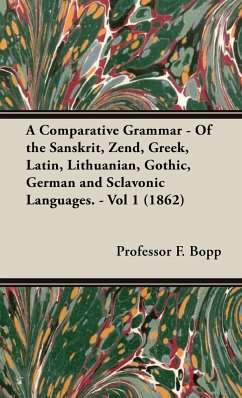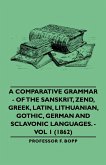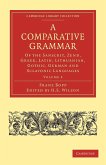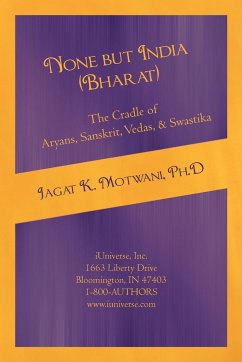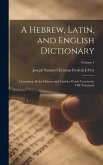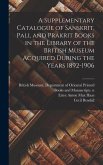Originally published in 1854. COMPARATIVE GRAMMAR OF THE SANSKRIT, ZEND, GREEK, LATIN, LITHUANIAN, GOTHIC, GERMAN, AND SCLAVONIC LANGUAGES. BY PROFESSOR F. BOP P. Text extracted from opening pages of book: PREFACE TO THE SECOND EDITION: IN giving to the Public this Second Edition of the English Translation of Bopp's great work on Comparative Grammar, it is right to state that the version has been approved by Professor Bopp himself, and that it has been again very care fully compared with the original; so that numerous errors, which, from the great length of the work were perhaps hardly to be avoided in a first, edition, have now been corrected* The appearance of the original, too, in parts, and at considerable intervals of time, led to some inconsistencies in the translation in the mode of expressing the value of certain letters ; but care has been taken to rectify this defect, also, in the present edition. The Table of Contents is altogether new, and will be found to be very much more copious than the German. Those who wish for an Introductory Notice before commen cing the study of the Grammar, or who mean to content them*, selves with a general notion of what has been achieved by the Author, may refer to the Edinburgh Review, No. CXCII. p. 298, and the Calcutta Review, No. XXIV. p. 468. It will be there seen that this Work has created a new epoch in the science of Comparative Philology, and that it may be justly assigned ? N place in that department of study corresponding to that of ( t 1 wton's Principia in Mathematics, Bacon's Novittm Organum in Mental Science, or Blumcnbach in Physiology. The encomiums of the Reviewer have in fact been justified by . the adoption of the Work as a Lecture Book at Oxford, and by the extensive use which Rawlinson and other eminent scholars have made of it in their researches. It remains to be added, that while the Notes and Preface . made by Professor Wilson, the former Editor, have been re tained, I must be myself held responsible for the errors and defects, whatever they may be, of the present edition. EDWARD B. EASTWrCK. HAILBYBUHY COLLEGE, February, 1854. PREFACE TO THE FIRST EDITION: THE study of Comparative Philology has of late years been cultivated in Germany, especially, with remarkable ability and proportionate success. The labours of GRIMM, POTT, BOPP, and other distinguished Scholars, have given a new character to this department of literature; and have sub stituted for the vague conjectures suggested by external and often accidental coincidences, elementary principles, based upon the prevailing analogies of articulate sounds and the grammatical structure of language. But although the fact that a material advance has been made in the study of Comparative Philology is generally known, and some of the particulars have been communi cated to the English public through a few works on Clas sical Literature, or in the pages of periodical criticism; yet the full extent of the progress which has been effected, and the steps by which it has been attained, are imper fectly appreciated in this country. The study . of the German language is yet far from being extensively pursued; and the results which the German Philologers have developed, and the reasonings which have led to them, being accessible to those only who can consult the original writers, are withheld from many individuals of education and learning to whom the affinities of cultivated speech are objects of interest and inquiry.

